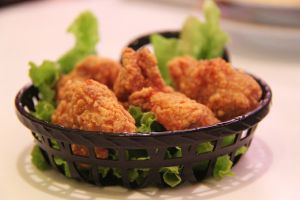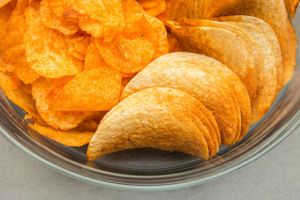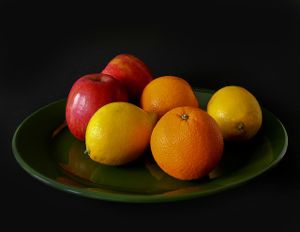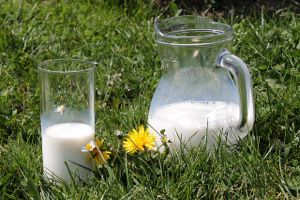We’re a nation who loves to eat.
Not only eat, but snack, graze, piece, munch, drink, savor, and slurp. And a lot of that is done while we’re writing.
We don’t think about how it affects our tummies…until it does. Then we complain. Stupid stomach! Who has time for bloating, cramps, gas, diarrhea, constipation, and all the rest?
No one. That’s why we need to be a little more aware of what we’re throwing into our mouths when we’re typing away.
If you want to write and have a comfortable stomach, keep these seven items off your desk.
 1. Soda and Fruit Juice
1. Soda and Fruit Juice
The issue here is sugar—about 3/4 teaspoon per ounce. And the majority of it is fructose, which for many people, is associated with symptoms of irritable bowel syndrome (IBS).
A 2014 study, for example, found that in people with IBS, 22 percent couldn’t absorb fructose well, and 28 percent were intolerant of it even without absorption problems.
Estimates are that as much as a third of Americans have trouble digesting fructose. If you suffer from digestive symptoms after writing, your soda or fruit juice may be to blame. Try water or tea instead.
Thinking about diet soda? Think twice. Studies have found that aspartame, sucralose, and saccharin can all alter gut bacteria in a way that leads to increased gastrointestinal issues.
Stevia-sweetened sodas may work for you, but be cautious. Most also contain sugar alcohols that could affect your stomach the same way.
 2. Coffee
2. Coffee
I know—it’s a staple for many writers. But some are likely to be sensitive to the acids in it.
They can irritate the stomach lining in some folks, and that irritation can cause excessive production of hydrochloric acid. That leads to indigestion and heartburn.
If your stomach is impervious, don’t worry about it, but if you notice symptoms after a coffee-fueled writing period, consider changing to tea. (Decaffeinated coffee has the same acids, so going caffeine-free won’t help.)
Yerba mate will give you a good caffeine punch, and licorice tea has a similar dark flavor and has actually been shown to help soothe the stomach.
 3. Fried Foods
3. Fried Foods
Writing over a fast-food lunch? You may want to be sure you have a bottle of antacids nearby.
Fatty, fried foods take longer to break down in the stomach—they’re harder to digest—so the stomach naturally produces more acids to manage them. Because of the difficulty digesting them, they may also cause acid reflux and diarrhea.
The simple process of frying a food damages protein and destroys enzymes that usually facilitate digestion. Because these foods are typically low in fiber, as well, they can also cause bloating and even constipation.
Keep the healthy choices if you’re writing over lunch—fruits, veggies, and lean protein.
 4. Potato Chips
4. Potato Chips
They’re America’s favorite snack food, and likely the one many writers turn to while mulling over a plot problem or difficult character development.
But for those with sensitive stomachs, it’s a bad choice.
Most potato chips are high in refined carbohydrates, which break down quickly in the stomach, moving too quickly through the intestinal system. The result can be bloating, cramping, and other symptoms.
In addition to that, studies have linked a high consumption of refined carbs to a higher risk of diabetes, depression, heart disease, and even food addictions. The key is to look for foods with whole grains and fiber that take longer to digest.
If you need chips, try baked lentil chips, multigrain tortilla chips, or plain sweet potato chips, which are all higher in fiber.
 5. Citrus Fruits and Raw Veggies
5. Citrus Fruits and Raw Veggies
These are “good-for-you” foods, but if you have a sensitive stomach, they may also be the cause of uncomfortable symptoms.
Like coffee, it’s the acids. Things like oranges, lemons, tomatoes, and grapefruits are naturally acidic and can irritate your stomach.
Raw veggies, as well, have high levels of insoluble fiber, which moves quickly through the digestive system, potentially causing gas, bloating, and diarrhea.
You can cook (or steam) your veggies, but that may not be very suitable for consuming while you’re writing. Your best bet is to choose fruits that are easy to digest, like bananas, plums, nectarines, and melons, or canned fruits like pears, peaches, and applesauce.
 6. Dairy Foods
6. Dairy Foods
You may be able to chug a glass of milk while you’re writing and be fine, but some people will have trouble digesting it because of the lactose, which is a type of sugar.
Millions of Americans are lactose-intolerant, but even in those who aren’t, an overconsumption of dairy products can cause some uncomfortable digestive symptoms.
If you’re craving dairy but have found you’re sensitive to it, try a cup of yogurt while you write. Cultured dairy products break down the lactose, and are easier on the stomach.
Yogurt also has probiotics, which help preserve the microbiome in the gut and may help improve digestive ailments. Just make sure you choose those that are low in sugar. Aged cheeses are also good choices.
 7. Too Much Food
7. Too Much Food
If you’re snacking while writing, you’re likely to lose track of how much you’re really eating.
And overeating, or eating too fast, are both primary causes of digestive upset.
It’s easy to do. Writing can be stressful, especially if we’re struggling that day, if we have deadlines looming, or if we’re facing discouragement in our careers at that moment.
We may also self-medicate with food to forget about the other stresses in our lives and better focus on the page. If we have only a short time to write, we may be stuffing our mouths as fast as we spit out the pages.
Too much food creates an excess load on the stomach and intestines, causing problems in digestion and absorption. Food consumed too quickly isn’t properly broken down in the mouth, so larger chunks are left to the stomach to deal with. That can result in discomfort and an excess of stomach acids.
The solution for this is an easy one—simply premeasure your snack before sitting down (or standing up) to write.
Pour a few nuts, healthy chips, fruit pieces, or yogurt in a small bowl, and when it’s gone, don’t rush for more. Reach for a cup of tea or water instead. (Check out our post on tea for options that fit your writing mood.)
Do you struggle with digestive issues after snacking during your writing time?

